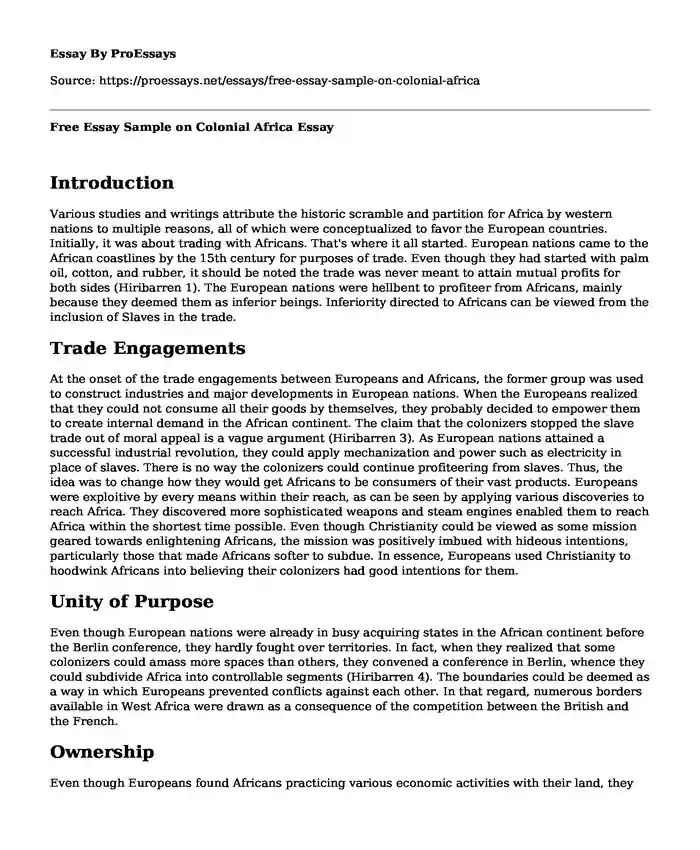Introduction
Various studies and writings attribute the historic scramble and partition for Africa by western nations to multiple reasons, all of which were conceptualized to favor the European countries. Initially, it was about trading with Africans. That's where it all started. European nations came to the African coastlines by the 15th century for purposes of trade. Even though they had started with palm oil, cotton, and rubber, it should be noted the trade was never meant to attain mutual profits for both sides (Hiribarren 1). The European nations were hellbent to profiteer from Africans, mainly because they deemed them as inferior beings. Inferiority directed to Africans can be viewed from the inclusion of Slaves in the trade.
Trade Engagements
At the onset of the trade engagements between Europeans and Africans, the former group was used to construct industries and major developments in European nations. When the Europeans realized that they could not consume all their goods by themselves, they probably decided to empower them to create internal demand in the African continent. The claim that the colonizers stopped the slave trade out of moral appeal is a vague argument (Hiribarren 3). As European nations attained a successful industrial revolution, they could apply mechanization and power such as electricity in place of slaves. There is no way the colonizers could continue profiteering from slaves. Thus, the idea was to change how they would get Africans to be consumers of their vast products. Europeans were exploitive by every means within their reach, as can be seen by applying various discoveries to reach Africa. They discovered more sophisticated weapons and steam engines enabled them to reach Africa within the shortest time possible. Even though Christianity could be viewed as some mission geared towards enlightening Africans, the mission was positively imbued with hideous intentions, particularly those that made Africans softer to subdue. In essence, Europeans used Christianity to hoodwink Africans into believing their colonizers had good intentions for them.
Unity of Purpose
Even though European nations were already in busy acquiring states in the African continent before the Berlin conference, they hardly fought over territories. In fact, when they realized that some colonizers could amass more spaces than others, they convened a conference in Berlin, whence they could subdivide Africa into controllable segments (Hiribarren 4). The boundaries could be deemed as a way in which Europeans prevented conflicts against each other. In that regard, numerous borders available in West Africa were drawn as a consequence of the competition between the British and the French.
Ownership
Even though Europeans found Africans practicing various economic activities with their land, they deemed the African continent ownerless. Their efforts to pursue lands in Africa were never regarded as encroachment, but they have deemed an acquisition (Hiribarren 5). To the Europeans, Africans were inferior to levels that their organizations were disguised and, in most cases, disbanded after being fought. It is worth noting that Europeans traded Africans as slaves because they treated them as their properties.
Conclusion
Even though Europeans' attitudes towards Africans could be deemed pernicious, all Africans did not react similarly to colonizers' arrival (Hiribarren 6). A minority of Africans reacted by fighting while the rest didn't. The difference between those who submitted and those who opposed the colonizers was their differences in inherent cultural systems. It was deemed that those communities who practiced cohesiveness and displayed local autonomy were more chanced to repel Europeans compared to those who had such weak structures. Other communities failed to fight Europeans because they had been suppressed after their initial contact with them. Others also used Europeans as a solution to their internal community conflicts.
Work Cited
Hiribarren, Vincent. Scramble for and Partition of West Africa.
Cite this page
Free Essay Sample on Colonial Africa. (2024, Jan 01). Retrieved from https://proessays.net/essays/free-essay-sample-on-colonial-africa
If you are the original author of this essay and no longer wish to have it published on the ProEssays website, please click below to request its removal:
- Essay Sample on World War 1 and 2 and Civil Liberties in America
- Adding a Modern Flair to African Jewelry Essay
- Mary Rowlandson's Experience in Captivity Essay
- Essay Sample on Admiral Chester Nimitz: Commander in Chief of the US Pacific Fleet
- Essay Example on Shays' Rebellion: Farmers vs Gov't in 1786-87
- Free Report Sample on Canadian Red Cross: Humanitarian & Community Support
- Business Plan - Free Sample







